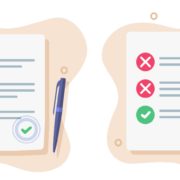How To Pass The MPRE With One Day Of Study
How To Pass The MPRE With One Day Of Study
With the MPRE fast approaching, many students are in the midst of studying for and preparing for the exam. For many, approaching the MPRE with 2 weeks to one month of study is ideal (and we recommend taking at least a few weeks to study for the MPRE!). This timetable gives students plenty of time to memorize material, acquaint themselves with questions, and mentally gear up for the exam. What happens, though, if you find yourself short on time heading into the MPRE? In this post, we discuss how to approach the MPRE with one day of study!
How To Pass The MPRE With One Day Of Study
Almost all jurisdictions in the United States require that students complete the Multistate Professional Responsibility Exam (MPRE) before approving attorney licensure. Most students get the MPRE out of the way during their 2L or 3L year of law school so they can turn their focus to the bar exam. Even with the best of intentions, some students sign up only to have the exam sneak up on them. This might be due to some life events, midterms or final exams that take up a lot of focus, or simple procrastination. So, what do you do when you put off studying and the exam is fast approaching? We include some of our best tips below!
What is the MPRE?
Before we get into how to pass the MPRE, we thought it might be useful to discuss what the MPRE actually is and why students should take it seriously.
The MPRE is a two-hour, 60-question multiple-choice examination that applicants take via computer. The exam is offered three times per year: October/November, March, and August. Students take the exam at Pearson VUE testing centers located throughout the country.
The MPRE is the same throughout the country, so you can take it wherever is most convenient, even if you don’t plan to practice in that particular state. For example, if you want to practice law in Chicago but are attending law school in New York, you can take the exam at a New York location if it’s more convenient. States explain how to get score reports over to them when you apply to be licensed in that state.
Topics That Appear on the MPRE
The MPRE tests a student’s comprehension of the Model Rules of Professional Conduct (MRPC). Many states adopt the MRPC in one form or another, and it is important to note that the MPRE does not test an examinee’s knowledge of any state-specific rules. Instead, the MPRE focuses on the following topics:
- Conflicts of interest
- Litigation and other forms of advocacy
- Lawyer-client relations
- Competence, legal malpractice, and civil liability
- Client confidentiality
- Regulation of the legal profession
- Different roles of a lawyer
- Communications about legal services
- Safekeeping funds and other property
- Transactions and communications with other persons
- Judicial conduct
- Lawyer’s duties to the public and legal systems
Take Our MPRE Crash Course!
Pretty much all commercial bar exam courses have a free MPRE course option (including us!) that provide you with outlines, practice questions, and other materials to help you prepare for the MPRE. If you don’t have a lot of time to prepare, signing up for one of these courses can be beneficial because they contain a myriad of practice materials that help you prepare for test day.
Our (free!) MPRE course also includes access to our MPRE Crash Course. This is perfect for students who are short on time to prepare for the MPRE (and for students who have been preparing but want a last-minute overview). Our MPRE crash course is about an hour and a half long, and it goes over highly-tested issues on the MPRE. We highlight our crash course in more detail below:
Regulation of the Legal Profession
Regulation of the legal profession makes up 6% to 12% of the questions on the MPRE. This includes the regulation of lawyers and how this rule applies when attorneys cross state lines. We also address supervisory requirements between partners, associates, and law clerks and prohibited restrictions regarding attorney employment as well as the sale of a law practice.
Lawyer/Client Relationship
The lawyer/client relationship accounts for approximately 10%-16% of the questions on the MPRE. What are the highly tested areas in this topic? They include the formation of the lawyer/client relationship. Additionally, these rules provide what decisions clients can make within the attorney-client relationship, when the attorney must withdraw from representation, attorney communication requirements, and fee agreements.
Client Confidentiality
Client confidentiality covers approximately 6%-12% of questions on the MPRE. In terms of highly tested areas, there are three main rules at play: attorney/client privilege, work-product doctrine, and duty of confidentiality. While client confidentiality isn’t the most frequently-tested topic on the MPRE, with only three rules to memorize, this topic can be a great way to earn some points!
Conflicts of Interest
There are more conflicts of interest questions on the MPRE than questions on any other topic! Conflicts of interest account for 12%-18% of the total number of questions on the exam. What types of questions appear under this subject area? Rules regarding concurrent conflicts, permissive current conflicts, former client conflicts (and associated derivatives), prospective client conflicts, and imputed conflicts of interest are fair game.
Additionally, we cover restrictions related to business transactions with clients, gifts to lawyers, and literary or media rights. Make sure you spend some time reviewing conflicts of interest and the accompanying rules!
Competence, Legal Malpractice, and Other Civil Liability
Competence, legal malpractice, and other civil liability make up about 6%-12% of questions on the MPRE. This topic centers around two highly-tested rules. The first revolves around competence and diligence. Additionally, we discuss the requirements of a malpractice action between an attorney and a client. We also provide tips on differences between attorney discipline proceedings and legal malpractice claims so you can easily recognize them on the exam!
Litigation and Other Forms of Advocacy
This topic makes up approximately 10%-16% of questions on the MPRE. Here, we discuss rules surrounding how to start a legal matter, candor toward the tribunal, and ex parte proceedings. We also review how lawyers need to handle disclosures of certain material.
Transactions and Communications with Persons Other Than Clients
Transactions and communications with persons other than clients account for only a small portion of the MPRE, coming in at around 2%-8% of the number of questions on the exam. What are some common issues that might appear on the MPRE under this category? These might include misrepresentations made by a lawyer (even if the client is insistent that the lawyer do so!) as well as how lawyers must handle communications with represented persons who are not clients and unrepresented individuals.
Different Roles of the Lawyer
The different roles of the lawyer make up approximately 4%-10% of the total amount of questions on the MPRE. What are the different roles that a lawyer might take on? Lawyers can act as advisors, negotiators, arbitrators, mediators, and other neutral third parties. We also spend some time talking about prosecutors and other government lawyers as well as attorneys who represent corporations.
Safekeeping Funds and Other Property
This is a smaller topic on the MPRE, making up about 2%-8% of the number of questions on the exam. One of the biggest things to be aware of under this issue is how to best handle client funds. We also discuss when an IOLTA account must be used when managing client monies as well as how to handle monies in the event of a dispute.
Communications About Legal Services
Communications about legal services account for 4%-8% of questions on the MPRE. Here, we work our way through how lawyers can advertise their services, restrictions covering reciprocal referral agreements, and how lawyers can solicit clients. Additionally, we discuss how lawyers can communicate about their services in compliance with the rules.
Lawyers’ Duties to the Public and Legal System
This makes up only a small portion of the MPRE coming in at 2%-4%. Under this topic, we discuss how a lawyer can provide volunteer legal services, things to be aware of when accepting or rejecting court appointments, and how attorneys can participate in law reform activities.
Judicial Conduct
Judicial conduct covers about 2%-8% of questions on the MPRE. These rules govern how judges must act in order to carry out their duties. Additionally, we work through reporting requirements for judicial and attorney misconduct. Finally, we review disqualification, including when judges cannot preside over certain matters, how judges can participate in extrajudicial activities, and restrictions on how judges can consult with government officials.
Learn the Law as Best as Possible
Even with only a day or two before the MPRE, you can still spend some time learning (and memorizing!) the law. Since time is of the essence, start with the highly-tested topics! We highlight them in our crash course, so that might be a good spot to begin. If you’ve already taken a Professional Responsibilities course in law school, you might be surprised at how much material is familiar to you.
We highlight above the areas that appear more frequently on the exam. By focusing your efforts on topics that are highly tested, you’ll have a greater chance of knowing how to respond to questions, even if you’re not completely aware of all of the issues that might appear on the exam!
Answer MPRE Practice Questions
Working through practice questions is also necessary, even when you’re short on time! This allows you to see how different topics might appear on exam day! By going through and engaging in practice questions, you’ll have a better understanding of how to approach answer choices, identify issues, and work through the material.
If you’re short on time, working through NCBE-released MPRE practice questions will provide you with materials you’re most likely to encounter on exam day. Try making your way through a practice exam so you can get a feel for both the questions and timing!
Most free MPRE courses do not offer NCBE-released questions, but If they are not in your budget, you can always work your way through simulated questions.
Make sure to self-grade your work! To do this, go through and investigate the answers you answer correctly and incorrectly. If you answer a question correctly, make sure you know why you got it right. If it’s incorrect, be sure to examine why you got it wrong! By doing so, you can better identify how certain issues are tested and how you can improve your score on exam day!
Looking to Ace the MPRE?
- Enroll in our 5-star rated free MPRE Course, complete with expert guidance, an exclusive outline, practice questions, and a one-sheet.
- Tackle the Real MPRE questions — the gold standard for test preparation.
- Elevate your preparation with personalized MPRE private tutoring, featuring a tailored study plan and dedicated MPRE outline.
- Dive into our assortment of complimentary top-notch MPRE resources for your success.










Leave a Reply
Want to join the discussion?Feel free to contribute!